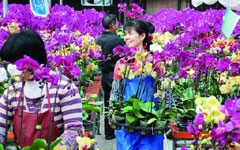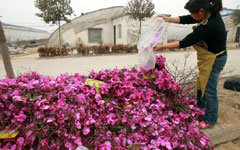Most of the flowers are grown by individual farmers, making it difficult to keep a pulse on demand and to plan for the next season. In such conditions, output and prices are prone to fluctuate sharply, particularly if there is extreme weather. After damage inflicted by cold weather, it can take farmers at least six months to find their feet again, Zhang says.
|
 |
|
 |
Flowers on which there has been excessive use of pesticides and fertilizer are liable to be rejected by overseas customs authorities, and Yang and his colleagues often visit farms to ensure that not too much is being used.
Yang says he invites new customers to closely inspect the areas from which they are buying flowers. Last winter, with the help of reports from Chinese media such as China Central Television, his overseas customers could see for themselves that quality was poor compared with the year before, he says.
But essentially "business is a matter of trust", and quality speaks for itself.
Usually, Singapore and the Philippines have lower standards for flowers, he says. South Korea, Japan and Hong Kong are much stricter.
To maintain standards, Yunnan has set up a special department, the Yunnan Provincial Office of Flowers, to oversee the industry, with policies to encourage technological innovation.
The shortcomings revealed by the winter cold last year and the inability of vendors to forecast demand and plan appropriately underline the need for new technologies and better management, Dong says.
